The digital age has seen a rise in the popularity of both NFTs and cryptocurrency. However, it is a common mishap for newbies to confuse the two since both concepts are intertwined. So what is the difference between NFTs and crypto?
The difference between an NFT is that it’s a unique digital asset, whereas crypto is an interchangeable digital currency developed as a medium of exchange. NFTs have unique identification codes, metadata, and other underlying assets that distinguish them from each other.
If you struggle to differentiate these digital components, we will discuss their relationship below and define them clearly.
What Is Cryptocurrency?
Cryptocurrency is a fungible asset that can be interchanged with another. For example, if I trade one Bitcoin for another, I’ll still have the exact same thing with an equal value.
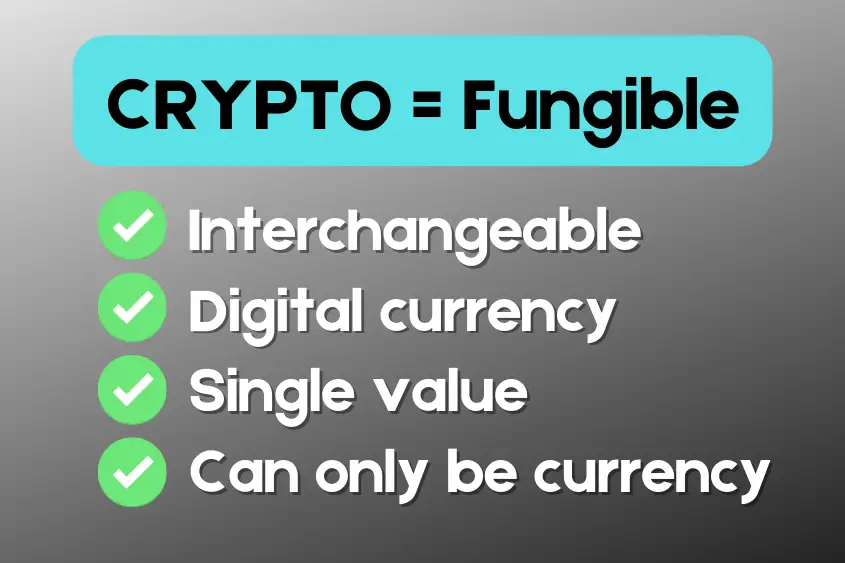
That being said, crypto is a form of digital currency that utilizes cryptography to create secure transactions. With that, cryptocurrencies do not have any central issuing and regulating bodies such as a bank.
To facilitate secure transactions, crypto relies heavily on utilizing a decentralized ledger to record trades and issue new units. This currency does not rely on existing banking institutions or third parties to verify transactions.
Instead, it uses a peer-to-peer system called the blockchain that enables anyone from anywhere to send and receive payments. Its purely digital currency eliminates all the hassle that would be required otherwise in traditional transactions.
Crypto prides itself on incorporating system encryption into all its transactions. These measures ensure that advanced coding is involved in every transaction between wallets and public ledgers, enhancing security and safety.
If you think cryptocurrency is a hoax, you are mistaken. The first ever cryptocurrency, Bitcoin, was introduced over a decade ago in 2009 and remains the most popular digital currency today. In fact, Bitcoin is so popular that there are currently more than 36,000 Bitcoin ATMs worldwide.
What Is an NFT?
NFTs are cryptographic assets created on the blockchain that are assigned unique identification codes and metadata, which set them apart and distinguish them from one another.
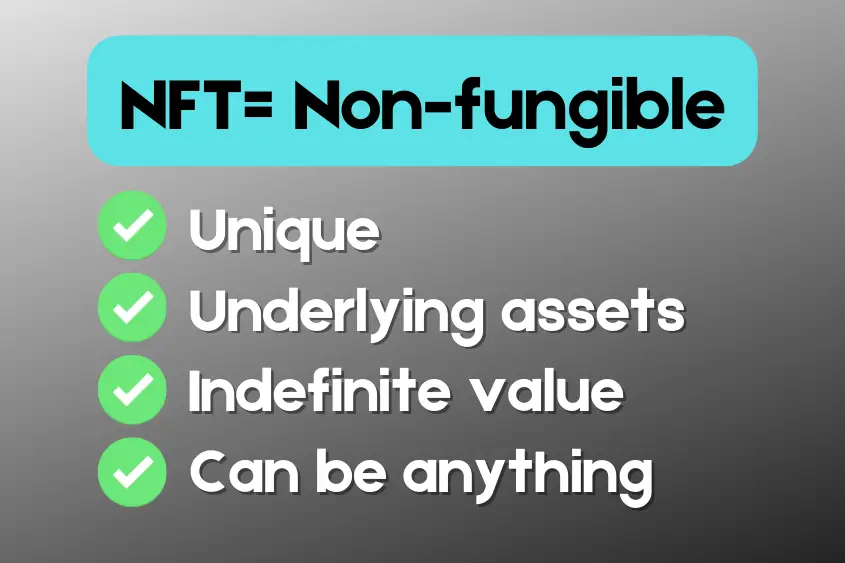
Being “non-fungible” means that NFTs have inherently distinct characteristics and attributes that cannot be replaced by something else. Similar to a one-of-a-kind trading card, there’s nothing that can replace an existing NFT.
An NFT can represent an array of both physical and digital assets. Using smart contract technology, these tokens can represent a digital item such as art, a physical product like shoes, or even access to an event, like a ticket.
Also, smart contracts can be updated indefinitely. This means an NFT can provide infinite value. For example, say you buy a Nike NFT in which the smart contract promises you one pair of limited-edition sneakers upon purchase. This means that not only does the NFT act as the sneaker’s proof of authenticity, but it also provides you with the physical product.
But wait, this smart contract can be updated at any point in time. So if Nike decides years down the line that all holders of this particular NFT receive a new pair of Nikes every five years, in addition to an airdropped NFT that represents each new pair, Nike can easily do that.
The most important aspect of an NFT is that it is minted (created) on the blockchain. Unlike the internet, the blockchain is an immutable, digital ledger. Using the blockchain you can easily track these tokens, verify their authenticity, and ensure that the asset you’re buying is actually what you expect it to be.
How Are NFTs Different from Crypto?
The easiest way to differentiate cryptocurrency from NFTs is to understand that crypto is a digital medium of exchange, and NFTs are digital assets that can represent anything. Below are some of the main differences between the two.
| NFTs | Crypto |
|---|---|
| Non-fungible (one-of-a-kind). | Fungible (interchangeable). |
| Can represent anything (digital and physical goods, contracts, etc). | Is simply a medium of exchange. |
| Custom smart contracts can be updated. | Limited smart contract capabilities. |
| Value is based on utility and brand. | Value is purely economic-based. |
| Often used as a status symbol. | Often used to purchase status symbols. |
If you think about it, cryptocurrencies aren’t much different than real-life money, except that it’s digital and not backed by any central banking institution.
Its utilities are similar to fiat currencies. They can be used for purchasing goods and as investment vehicles thanks to their theoretical value.
On the other hand, NFTs have a more comprehensive array of utilities in metaverse, art, gaming, event tickets, real estate, and hospitality industries. More use cases for NFTs are being developed as the technology becomes more widespread.
The utility of an NFT is also a big factor in determining its value. NFTs are purchased and traded for their artistic quality, but a fast-moving space has forced NFT project developers to come up with further perks and utilities that go beyond owning an asset.
Overall, it’s safe to say that NFTs have the potential to offer you more in terms of use. Money is money, but assets can provide you with a number of perks. And that’s exactly the case when differentiating NFTs and cryptocurrency.
Cryptocurrency is just currency. NFTs can represent any kind of product, access to an event, as well as an agreement or contract.
How Does Cryptocurrency Relate To NFTs?
Cryptocurrency and NFTs are relatable because they are both digital assets tracked and verified using blockchain technology. Also, they are both decentralized and secured using the same technology. And even though crypto and NFTs are considered potential investments, they are both volatile assets.
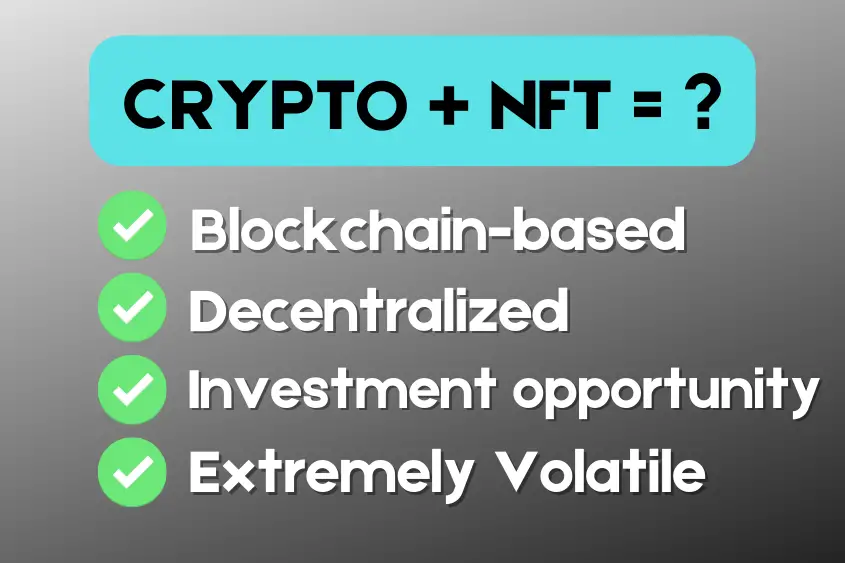
Below are various ways in which cryptocurrency and NFTs are related.
Both Crypto and NFTs Utilize Blockchain Technology
Both crypto and NFTs are digital forms of assets that live on the blockchain. The utilization of this technology allows both of these assets to be tracked, verified, and traded without an intermediary. This creates a completely trustless system that allows assets to be traded 24/7, from anywhere.
So although these two assets utilize the same technology (similar to how a debit card and eCommerce both utilize the internet), they have different uses.
Cryptocurrency Is Used To Buy NFTs
Considering NFTs are decentralized assets that live on the blockchain, there is only one way to keep them decentralized—and that is to use a decentralized form of payment for buying them, hence cryptocurrency.
That’s why I like to refer to crypto as the payment method, and NFTs as the product/agreement.
You Can Invest in Both Crypto and NFTs
Although these two assets have different functions, they both have the potential to be good investment opportunities.
The main difference when investing in crypto is that you are betting on whether or not the currency will remain a reputable and preferred medium of exchange. Both ETH and Bitcoin remain the two most preferred cryptocurrencies, mainly due to their reputation and use case.
Whereas investing in an NFT is more similar to investing in stocks because you are betting on the person/company that’s behind the creation of an NFT, and their ability to create and maintain demand.
Either way, investing in crypto and NFTs is risky business. If you are considering investing in NFTs, then I recommend you check out my collector’s buying guide. This guide shows you everything you need to know to help you make the best decision when it comes to buying a good NFT.
Crypto and NFTs Are Both Volatile Assets
From an investment standpoint, both cryptocurrency and NFTs are considered to be extremely volatile.
The price of crypto fluctuates by the minute and is ultimately at the hand of holders. Considering there is generally a max supply of cryptocurrency that’s created and distributed, holders with large shares can greatly affect the value if they decide to liquidate their holdings.
And since it is still very early in the macro aspect of cryptocurrency, there’s no telling which crypto will be a good investment in the long run. Especially considering that there are currently over 19,000 cryptocurrencies in existence.
On the other hand, NFTs rely heavily on a company’s ability to provide holders with value and build a brand name for themselves.
Similar to how Ferarri is known as a luxury sports car manufacturer, you can buy a Ferarri and potentially profit from your purchase. But if a random car manufacturer pops up, it would be much more difficult to buy one of its vehicles expecting to make a profit, simply because the brand is so new and doesn’t have a solid reputation like Ferarri.
Ultimately, both assets are volatile. It’s up to you to determine what you expect to gain from your investments if that’s the route you want to take.
Are NFTs Better Than Crypto?
NFTs and crypto provide holders with completely different values, so it’s not fair to say one is better than the other. NFTs can provide holders with instant value via products and access, whereas crypto is simply a medium of exchange. Regardless, both provide unique investment opportunities.
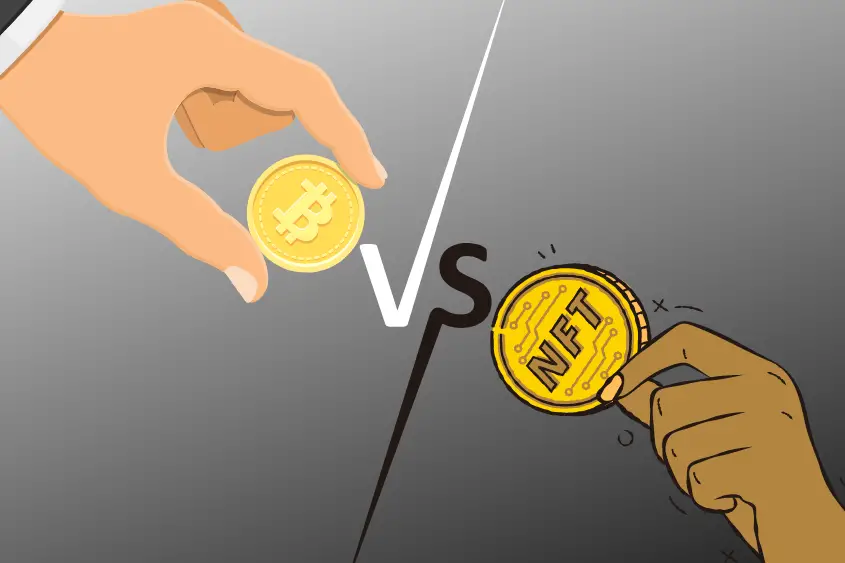
Before anyone can really answer this question, first you need to ask yourself what it is you want. Are you looking to solely make a profit? Or are you looking for other forms of value as well?
Value of an NFT
The value proposition of an NFT is much greater than that of a cryptocurrency. Considering an NFT can represent just about anything, (a digital or physical product, a contract, access to an event, etc), there are many forms of value that can be extracted from purchasing an NFT.
Moreover, many people acquire an NFT as a symbol of status. Similar to how people wear a Rolex or drive a BMW, owning a certain NFT (such as a Bored Ape) is often seen as a flex in the digital space.
Ultimately, if you desire the associated utility that an NFT offers, then it only makes sense that a particular NFT may provide you with more value than any cryptocurrency ever would.
That being said, you may need to obtain a certain cryptocurrency in order to buy said NFT, so that alone could deem a cryptocurrency valuable.
Value of Cryptocurrency
Beyond serving as a means of exchange, cryptocurrency doesn’t provide much value to holders. Of course, those who choose to buy cryptocurrency solely as an investment might think otherwise, respectively.
With that, the main reason why you might consider buying a particular cryptocurrency is to use it as a medium of exchange (to buy an NFT) or speculation (as an investment).
Taking all this into consideration, my hope is that you understand determining whether NFTs or cryptocurrency is better comes down to your personal goals and desires. Though both assets serve different purposes, they are both valuable in their own way. It’s up to you to determine that value.
Should You Invest in NFTs or Crypto?
You should invest in NFTs if you enjoy the perks it offers you and if you believe it’s worth the price. Only buy crypto if you have a use for it or if you have reason to believe its value will increase. Either way, always do your own research and never spend more than you can afford to lose.
Most crypto investors seek to make a profit from the fluctuating value of crypto, taking into account that crypto investment is riskier than stocks or real estate.
The main difference between a crypto trader and a crypto investor is that traders tend to invest in the short term. In contrast, investors invest their capital into promising projects in the long term.
The same happens with NFTs. Traders seek popular collections with a high probability of making a profit and purchasing them. In less than six months, they’ll sell their NFTs for profit and reinvest their profit to purchase more NFTs, rinse and repeat.
NFT investors will seek promising NFT projects with a unique value proposal or innovative utilities and invest in them, helping them grow. While they might not obtain instant profit from their investment, they can hold on to their assets for a while until they skyrocket in value.
This happened with many NFT projects, such as Bored Ape Yacht Club, CryptoPunks, and other less-famous projects.
Although non-fungibility and scarcity are play a rolie in how NFTs attain their value, ownership history is another major pillar of NFT pricing. If a famous person owned the NFT, it might be perceived by the public as more valuable than normal, precisely because people will see it as more valuable.
Ultimately, you should invest in what you know best and what you believe will benefit you the most. NFTs come with more perks and potential utility.
Crypto on the other hand is really only good for one thing—as a medium of exchange to buy things.
Can You Buy an NFT Without Crypto?
You can buy NFTs without cryptocurrency by using a platform such as Moonpay. This platform works with popular marketplaces to allow users to buy NFTs using just their bank card. Additionally, marketplaces like Crypto.com and Veve enable users to purchase NFTs with nothing more than a debit card.
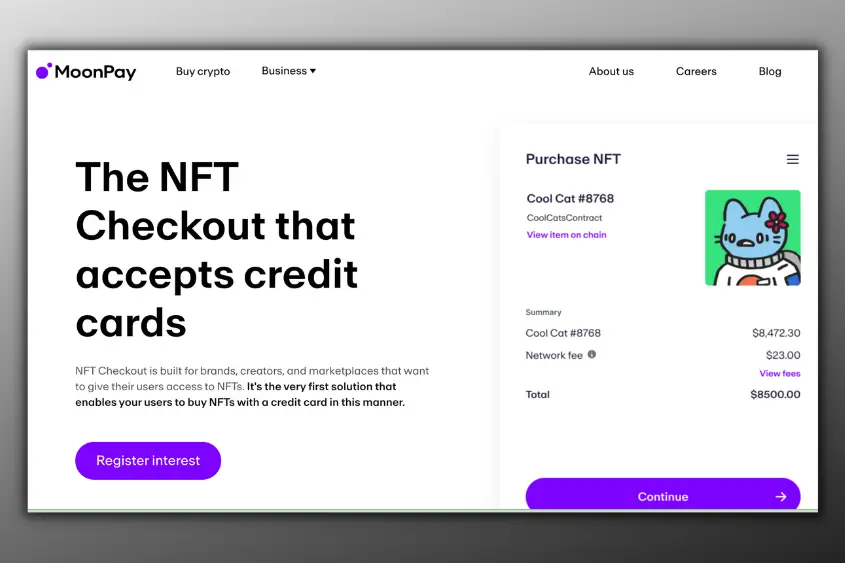
If you’re considering buying an NFT but you are hesitant because you don’t want to buy crypto, I understand. Luckily, there are platforms such as Moonpay that work with the most popular NFT marketplaces like Opensea and SuperRare to enable users to buy NFTs with nothing more than a debit card.
Additionally, there are some marketplaces like Crypto.com and Veve that allow you to buy their NFTs without cryptocurrency. The downside to these kinds of marketplaces is that the types of NFTs you can buy are limited.
So if you want to browse a popular marketplace like Opensea that offers nearly every kind of NFT, then I suggest you utilize the Moonpay option, or just learn how to buy an NFT using cryptocurrency with my step-by-step guide for beginners.
The relationship between cryptocurrencies and NFTs doesn’t need to be complicated, albeit they are similar. It may seem like it at first since NFTs tend to stray away from cryptos and carry out an independent function, especially in terms of investment options and sales. However, crypto and NFTs function in line with specific blockchains like Ethereum.
Both are protected from fraud and counterfeiting and have a designated wallet and ledgers to record transactions. However, what sets crypto and NFTs apart is their utilization.
NFTs are ultimately a wide range of digital assets, such as images, videos, etc., that are unique and sold online. Moreover, the overall value of these tokens will depend on the stock value of the corresponding cryptocurrency. Finally, a tangible relationship between an NFT and crypto must be considered by the potential buyer, seller, investor, and collector.
